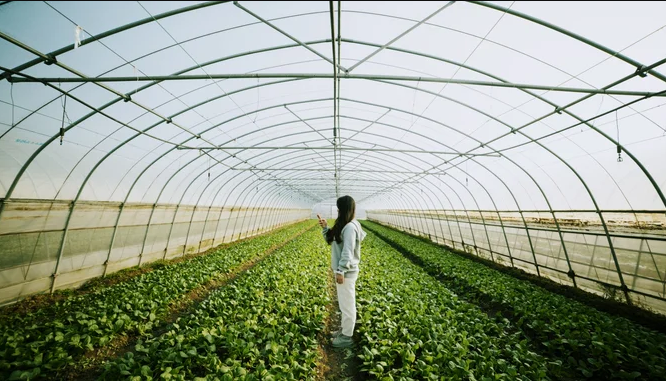The term “sustainable” is a popular or trending term that can express various concepts. Yet, what exactly is sustainable agriculture? Sustainable agriculture cultivates agricultural goods, including food, that safeguard the ecosystem, public health, communities, and animal protection.
Sustainable agriculture enables us to grow and consume healthy meals without jeopardizing future generations’ capability to follow in our footsteps. Establishing the right balance between the requirement for agricultural production, focusing on top-quality tractors, i.e., John Deere Tractor and the conservation of environmental ecosystems is critical to sustainable agriculture. This blog will unveil every aspect of sustainable agriculture and how it benefits mother earth.
What is Sustainable Agriculture?
Sustainable agriculture is cultivating environmentally friendly processes, which implies satisfying society’s existing food and textile demands without negatively impacting the capacity for either present or future generations to meet those requirements.
Farming that serves the requirements of generations to come while also assuring profitability, environmental safety, and social and economic equality is what agriculture is all about. It prefers natural-like practices for preserving soil fertility, preventing water pollution, and protecting biodiversity.
It consumes up to 56% fewer resources per unit of crop grown, emits 64% lesser greenhouse gas per hectare, and promotes higher levels of biodiversity than traditional farming.
What Benefits Does Sustainable Farming Alone Offers?
Synthetic fertilizers and pesticides hastened agricultural industrialization, but increased output and efficiency come at a high cost. As a result, greenhouse gas emissions increased, and our water and air became increasingly polluted.
It doesn’t end there. Around 43 pesticides(mosquito control service) currently travel through the bloodstream of every American, causing negative health impacts. Farm owners who are more susceptible to chemicals are more vulnerable.
So what are the advantages of organic farming? What change can it create in our environment?
-
Less Pollution
Air quality is impacted by smoke from agricultural burning, particles from tillage, traffic, and harvesting, and pesticide drift from spraying, and nitrogen oxide emissions from nitrogen fertilizer use. And herein lies one of the significant environmental advantages of sustainable agriculture!
Sustainable agriculture can improve air quality by soaking agricultural residue into the soil and using proper quantities of tillage. One can also reduce the Dust by planting windbreaks, cover crops, or strips of natural perennial grasses.
-
Preserving Soil & Land
Since crops may be alternated throughout the year, both runoff and degradation are considerably minimized in sustainable agriculture. It gives the soil varying micronutrients from the various plants, boosting its richness. Fertilizer drainage is usually reduced, making it better soil-less and prone to erosion. Sustainable agriculture also promotes the development of indigenous bacteria in the ground, which provides additional nutrients to the crops.
Sustainable farming uses every farm’s land area by planting diverse crops, such as tall, sun-loving plants beside shorter, shade-loving plants. The benefit of this scenario is that extra crops are grown per acre, and farmers and gardeners use free farmland for conservation through Ace Tractor. It also contributes to the health of the crops. Typical industrial farming consumes large quantities of land, but it is more difficult to utilize the entire acreage because most plots only grow a particular crop.
-
Promoting Biodiversity
Crop rotation, for example, helps replenish the soil and minimizes disease and insect epidemics by using environmentally friendly and sustainable farming practices. But its impact does not end there. Farmers can use this strategy to cultivate a broad spectrum of crops, increasing biodiversity in the community.
Employing pesticide-free farming techniques also contributes to rising pollinator populations, which have declined over the years. Patched bumble bees are a typical case of pollinators who have suffered from widespread pollutants.
-
Animal Welfare Improvements
Sustainable agriculture eliminates cruelty in factory farming by reducing farm animal exploitation. Because landowners in the sector save expenses by cramming as many animals as possible into a tiny space, industrial factory farming is infamous for its inhumane treatment of animals during the operation. It fosters a harsh environment for the animals.
Additionally, not only are the animals mistreated but being crammed together promotes disease transmission, which can lead to illnesses and death. By combining a modest amount of livestock with plant-based farming, sustainable agriculture offers wildlife a high quality of life. It provides an adequate area for the animals to wander and a humane setting for domesticated animals following a nutritious plant-based diet.
-
Building Industries, Innovation, and Infrastructure
Sustainable agriculture is important in developing more energy-efficient and resource-efficient agricultural infrastructure. Sustainable agricultural experts may establish by prioritizing solutions with a lower environmental impact. Advanced zero-tillage, intercropping, cover crop practice and mobile technology for weather forecasting and crop disease control are environmentally friendly agriculture advances.
Final Thoughts
Sustainable agriculture is farming that is helpful to the environment, wildlife, and mankind. This philosophy understands that the planet must remain in good shape to cater to coming generations. This style of farming takes a whole-ecosystem strategy, engaging in a strong system overall — a rather more ecologically sound food system — encompassing the well-being of individuals and animals, community health, ecological health, and soil health.
